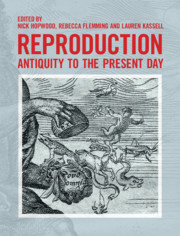Book contents
- Reproduction
- Frontispiece
- Reproduction
- Copyright page
- Dedication
- Contents
- Exhibits
- Illustrations
- Notes on the Frontispieces
- Contributors
- Acknowledgements
- Introduction
- Part I Inventing Generation
- 2 Phallic Fertility in the Ancient Near East and Egypt
- 3 Women and Doctors in Ancient Greece
- 4 Animal and Plant Generation in Classical Antiquity
- 5 States and Populations in the Classical World
- 6 The Ancient Family and the Law
- 7 Galen's Generations of Seeds
- 8 Debating the Soul in Late Antiquity
- Part II Generation Reborn and Reformed
- Part III Inventing Reproduction
- Part IV Modern Reproduction
- Part V Reproduction Centre Stage
- Epilogue
- Exhibits
- Select Bibliography
- Index
6 - The Ancient Family and the Law
from Part I - Inventing Generation
Published online by Cambridge University Press: 16 November 2018
- Reproduction
- Frontispiece
- Reproduction
- Copyright page
- Dedication
- Contents
- Exhibits
- Illustrations
- Notes on the Frontispieces
- Contributors
- Acknowledgements
- Introduction
- Part I Inventing Generation
- 2 Phallic Fertility in the Ancient Near East and Egypt
- 3 Women and Doctors in Ancient Greece
- 4 Animal and Plant Generation in Classical Antiquity
- 5 States and Populations in the Classical World
- 6 The Ancient Family and the Law
- 7 Galen's Generations of Seeds
- 8 Debating the Soul in Late Antiquity
- Part II Generation Reborn and Reformed
- Part III Inventing Reproduction
- Part IV Modern Reproduction
- Part V Reproduction Centre Stage
- Epilogue
- Exhibits
- Select Bibliography
- Index
Summary
- Type
- Chapter
- Information
- ReproductionAntiquity to the Present Day, pp. 81 - 94Publisher: Cambridge University PressPrint publication year: 2018



